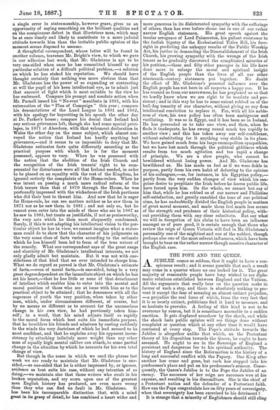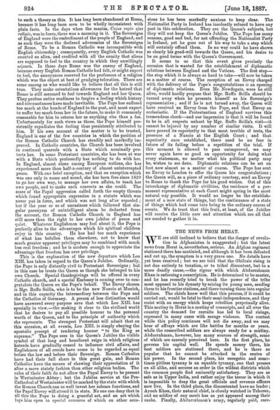THE POPE AND THE QUEEN.
A JUBILEE comes so seldom, that it ought to have a con-
spicuous result ; and it seems possible that such a result may come in a quarter where no one looked for it. The great majority of reasonable people have long wished to see diplo- matic relations established between England and the Vatican. All the arguments that really bear on the question make in favour of such a step, and there is absolutely nothing to pre- vent it except the fear of arousing an almost extinct prejudice, —a prejudice the real force of which, from the very fact that it is so nearly extinct, politicians find it hard to measure, and so hesitate to provoke. A feeling of this kind is not to be overcome by reason, but it is sometimes amenable to a sudden emotion. It gets displaced somehow by the shock, and while the shock lasts public opinion will see things done without complaint or question which at any other time it would have contested at every step. The Pope's attitude towards the Jubilee is altogether unlike that which, on the Protestant theory of his disposition towards the Queen, he ought to have assumed. He ought to see in the Sovereign of England a persistent and dangerous foe to his spiritual authority. The history of England since the Reformation is the history of a long and successful conflict with the Papacy. One King after another has come and gone, but each has stepped into his predecessor's place and put on his predecessor's armour. Conse- quently, the Queen's Jubilee is to the Pope the Jubilee of an enemy. The successes of her reign are successes won at his expense, and resulting in his discomfiture. She is the chief of a Protestant nation and the defender of a Protestant faith. How can the Pope congratulate her on fifty years of sovereignty, when that sovereignty has been exercised to his detriment It is strange that a minority of Englishmen should still cling to snob a theory as this. It has long been abandoned at Rome, because it has long been seen to be wholly inconsistent with
plain facts. In the days when the maxim, Cujus ?via ejus religio, was in force, there was a meaning in it. The Sovereigns of England were the embodiment of the people of England, and
as such they were the declared adversaries of the Sovereigns of Rome. To be a Roman Catholic was incompatible with English citizenship ; consequently, every English Catholic was counted an alien, and credited with all the enmity that aliens are supposed to feel to the country in which they unwillingly sojourn. In those days Rome was the enemy of England, because every English Roman Catholic had felt, or might expect to feel, the annoyances reserved for the professors of a religion which was the object at best of grudging toleration. There are
some among us who would like to believe that all this is still true. They make ostentatious allowances for the hatred that Rome is still assumed to feel towards England and her Queen. They profess entire readiness to forgive a feeling which history and circumstances have made inevitable. The Pope has suffered too much at the hands of England in the past, and must expect to suffer too much from her in the future, to make it commonly reasonable for him to esteem her as anything else than a foe. Unfortunately for such views as these, the Pope himself per- sistently repudiates the feeling thus persistently attributed to him. If his own account of the matter is to be trusted, England is one of the few countries in which the position of the Roman Catholic Church has steadily and markedly im- proved. In Catholic countries, the Church has been involved in continual quarrels with a State which nominally pro- tects her. In some Protestant countries, she has been at war with a State which professedly has nothing to do with her. In England, almost alone among European nations, she has experienced more than half-a-century of almost uninterrupted peace. With one brief exception, and that an exception which was one only in name and sound, she has been free since 1829 to go her own way, to manage her own affairs, to teach her own people, and to make such converts as she could. The scare of the Papal aggression called forth the empty threats which found appropriate expression in a statute which was never put in force, and which was not long after repealed ; but if the year or so of uneasiness which followed that sin- gular paroxysm of unintelligent alarm be deducted from the account, the Roman Catholic Church in England has still more than the right to her own jubilee of peace and quiet. Whatever Englishmen may feel about it, the Pope is perfectly alive to the advantages which his spiritual children enjoy in this country. He has had too much experience of what has befallen them elsewhere, not to know that much greater apparent privileges may be combined with much less real freedom ; and he is modem enough to appreciate the advantage that freedom has over privilege. This is the explanation of the new departure which Leo XIII. has taken in regard to the Queen's Jubilee. Ordinarily, the Pope is only distantly civil to Protestant Sovereigns ; but in this case he treats the Queen as though she belonged to his own Church. Special thanksgivings will be offered in every Catholic church, and a special Embassy is coming over to con- gratulate the Queen on the Pope's behalf. The Envoy chosen is Mgr. Buffo Scilla, who is to be the new Nuncio at Munich, and in this capacity the intermediary between the Pope and the Catholics of Germany. A person of less distinction would have answered every purpose save that which Leo XIII. has specially in view,—the making it clear to the civilised world that he desires to pay all possible honour to the personal worth of the Queen, and to the principle of authority which she represents. The strongest Protestant will admit that on this occasion, at all events, Leo XIIL is simply obeying the apostolic precept of rendering honour "to the King as supreme." The Pope sees in the Queen's Jubilee the visible symbol of that long and beneficent reign in which religious hatreds have gradually ceased to influence civil affairs, and Englishmen of all creeds have come to be regarded as equal before the law and before their Sovereign. Roman Catholics have had their full share in this great gain, and Roman Catholics have the means of showing their appreciation of it after a more stately fashion than other religions bodies. The rules of their faith do not allow the Papal Envoy to be present in Westminster Abbey ; but the Jubilee service at the Pro- Cathedral of Westminster will be marked by the state with which the Roman Church can so well invest her solemn functions, and the Papal Envoy will attend it in state. No one can deny that in all this the Pope is doing a graceful act, and an act which lays him open to special censures of which on other ma- dons he has been markedly anxious to keep clear. The Nationalist Party in Ireland has insolently refused to have any part in this celebration. They are the Queen's subject's, but they will not keep the Queen's Jubilee. The Pope has many reasons, good and bad, for not offending the Nationalist Party in Ireland, yet he goes out of his way to take a step which will certainly offend them. In no way could he have shown so clearly his good-will towards the Queen, and his desire to be on good terms with the Queen's Government.
It seems to us that this event gives precisely the occasion that is wanted for the establishment of diplomatic relations between England and the Vatican. The first step— the step which it is always so hard to take—will now be taken as a matter of course. The reception of an Envoy charged with the delivery of the Pope's congratulations is an opening of diplomatic relations. Even Mr. Newdegate, were he still alive, would hardly propose that Mgr. Buffo Sculls should be turned away when he presents himself as his Sovereign's representative ; and if he is not turned away, the Queen will have received an Envoy from the Pope, and that Envoy an ecclesiastic. If the Protestantism of England survives this tremendous shock—and our impression is that it will be found to be in all respects unhurt by Mgr. Ruffo Scilla'e, visit--it cannot be injured by any number of similar visits. It will have proved its superiority to that most terrible of tests, the presence of a Nuncio at the English Court ; and that superiority once established, there need be no fear in future of its failing before a repetition of the trial. If this moment is allowed to pass unimproved, we may never again have so good an opportunity for doing what every statesman, no matter what his political party may be, wishes to see done. Diplomatic relations can be set on foot now almost as a matter of course. The Pope has sent an Envoy to London to offer the Queen his congratulations ; the Queen will, as a piece of ordinary courtesy, send an Envoy to Rome to thank the Pope for his good wishes. Out of this interchange of diplomatic civilities, the residence of a per- manent representative at each Court might spring in the most natural way possible. It would no longer be the establish- ment of a new state of things, but the continuance of a state of things which had come into being in the ordinary course of events. We do trust that this fruit, at least, of the Jubilee will receive the little care and attention which are all that are needed to gather it in.



































 Previous page
Previous page